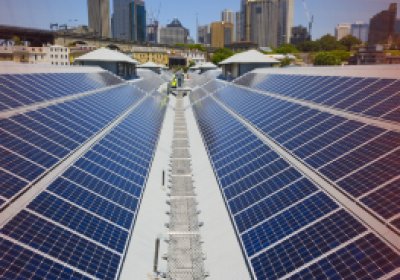Australia has fallen behind similar economies around the world in the generation of renewable energy, a new report has found.
The Climate Council’s new report, The global renewable energy boom: How Australia is missing out, says that despite having enough renewable energy resources to power the country 500 times over, jobs and investment in the renewables sector have fallen sharply since the Coalition government came to power.
Renewable energy
Despite the brutal cuts to leading renewable energy bodies by the Coalition government last year, incredible benchmarks in the field have been achieved.
With news that the unlikely climate conscience of the Palmer United Party is holding firm, it appears that the Renewable Energy Target (RET) and associated programs will not be scrapped just yet. But the uncertainty of what will happen in the long term may be enough to bring large-scale wind and solar projects to a standstill.
The Renewable Energy Target could become a victim of its own success. A review into the scheme, released on August 29, has recommended the federal government close new investment into renewable energy because it has produced more energy than originally planned.
But Labor, Greens and Palmer United Party senators have vowed to block any changes to the scheme.
At the same time, a debate has emerged among climate activists about whether we should “change tack” when it comes to campaigning on the issue of climate change.
Numerous wind farm developments across Victoria may face termination due to the highly inflexible and restrictive nature of the Denis Napthine government’s anti-wind farm laws and permit rules.
The Weekly Times reported that the 20 companies granted permits before the introduction of these laws have been denied the ability to make simple upgrades to their turbines.
Greens leader Christine Milne is challenging Prime Minister Tony Abbott to call a double dissolution election this year over the passage of a renewable energy bill.
Milne said: “The Greens are ready for an election over the prime minister's global warming denial and his brutal budget.”
Workers cooperative EarthWorker demonstrated their newly made heat pumps and water storage tanks at Melbourne’s Trades Hall on May 18.
The cooperative aims to create local jobs and provide clean energy to help fight the climate crisis at the same time. It has just launched its first solar hot water systems, made at a worker-owned factory in Morwell.
During the event at Trades Hall, members of the cooperative were happy to demonstrate and explain the capabilities of their new systems.
Outside the city of Port Augusta in South Australia, the firm Alinta Energy runs the ageing brown coal-fired Northern power station. Environmentalists and local campaigners want the plant replaced with state-of-the-art solar power generation. But Alinta would rather solar power were used to pre-heat water for the existing plant, which would then stay in operation for further decades.
The right-wing war on renewables is heating up as the Tony Abbott government announces yet another investigation into wind energy and health, and a review of the Renewable Energy Target.
It's long been a favoured wish of many environmentalists to go off the grid, to be self-sufficient in energy and other services, and avoid the corporate utilities and their coal-powered electricity. The ambition for freedom from energy bills and fossil-fuel electricity is understandable.
And now in the age of relatively cheap solar panels (which weren't around in the 1970s), you can live off the grid and use a huge battery attached to a large array of solar PV (photovoltaic) panels, to maintain a hi-tech lifestyle on clean solar energy.
Energy use in buildings accounts for about 20% of Australia’s total greenhouse gas emissions. A new report says Australia’s existing building stock could be made emissions-free in 10 years, while saving about $40 billion in energy bills over 30 years.
Dave Kerin from the Victorian Earthworker Cooperative toured the Hunter region on July 30 and 31 to talk about the Eureka Future Cooperative. The cooperative plans to make solar hot water units in the LaTrobe Valley of Victoria, with the support of trade unions, the Uniting Church, Victoria Trades Hall, the Australian Council of Trade Unions and community fundraising.
The project is particularly relevant to the Hunter, whose coal industry is in the midst of an overproduction crisis, fuelled by lower than expected demand for steaming coal from China and the rise of renewables worldwide.
- Previous page
- Page 7
- Next page









